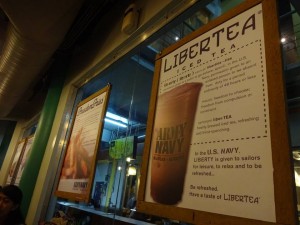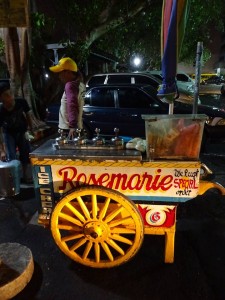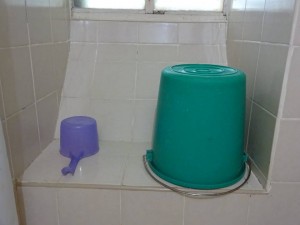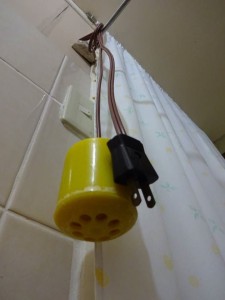We’re about halfway through our time here now – we’ve been here about a month and we have one more left. Things are starting to pick up here, as school has started in St. Scho and we’re starting to get a lot of projects and full schedules. Being busy is a welcome relief though, as almost the entire first week of school was cancelled due to heavy rains caused by Typhoon Falcon moving through the Philippine Area of Responsibility. Although rains are not uncommon here and the flooding they feared wasn’t all that severe, the entire school district in Manila for grade school through college had classes suspended as a precaution. During tropical storm weather the floods can sometimes get halfway up the sides of buildings in low-lying areas, and getting stranded somewhere when the roads become impassible is a serious concern, especially as many students commute for upwards of an hour or two in city traffic. I’m told that there are three more typhoons expected in this area within the month though!! Hopefully they won’t be too serious, else we’re looking at more days stuck inside afraid to go anywhere for fear of not being able to get back. (In other news, I now own my first pair of rainboots, size 38!)
In our internship, we’re getting exposure to a wide range of activities and projects. With only a month left, fitting in all the projects they propose seems ambitious, but I hope we get to do most of what is scheduled. Here’s a sampling of what I’ll be up to:
- facilitate a campaign to promote the sale of donated perfumes from a factory that closed with proceeds going to the Outreach committees of St. Scho
- gather data and research trends among habitual offenders in order to help the Student Affairs Office profile for potential problem groups and anticipate troublemaking
- write and organize (and then facilitate) an afternoon leadership training for first and second year student leaders
- assist the grade school students in their student governance campaigns (yes, even elementary school kids run for election to class representative here). Kelsey will be helping them to come up with “jingles,” and I’ll be helping them develop their campaign platforms…lol
- assist in the weekly taping of “Nunsense Makes Sense” – a talkshow Sister Mary John Mananzan hosts, filmed in a studio in the MassComm wing of St. Scho
- help out in the understaffed office of College Outreach, and assist in the planning and execution of community service programs for student groups, getting cultural exposure and service experience ourselves in the process in various urban and rural areas in and around Manila
- Guest lecturing!! Mrs. Becky Marquez, the Dean of Student Affairs and also a professor in the departments of MassComm and Women’s Studies, has asked me to take over one of her Women’s Studies classes on a day when she has to attend a meeting. She’s asked me to prepare something on the distinction between sex and gender, which is something I’m knowledgeable of and confident in my ability to teach. Mae Rafanan, the Assistant Dean of Student Affairs and a professor in the Psychology/Counseling department has also asked Kelsey and I to talk to her classes about the process of choosing a career path in our home country, as here in the Philippines parents essentially choose the “course” their children will pursue in college
I also keep a running list of my observations about the culture. Some of these things I may have already mentioned, as they are very very basic, but I couldn’t remember if I had already posted about them or if I had forgotten to list some of the most salient and pervasive elements of the cultural landscape in those first days. Here are some more observations:
- People will look at you strangely if, in a fast food restaurant where you’re served on a plastic tray, you try to carry the tray to its stand and throw your own garbage away (I learned this the hard way). Here, you just leave it at your table and the staff will take care of it.
- Farming and agriculture are an integral part of the Philippine economy, but you won’t see any tractors or machinery here. Instead, you’ll see hand-held hoes, plows pulled by the carabao (related to an ox) and followed by a farmer, or people stooped over to manually plant and harvest the crop in a rice paddy. Agriculture in modern-day Philippines doesn’t look all that different from carved reliefs of farming in Mesopotamia, 3000 BCE.
- Many beggars are blind or handicapped because they will actually sell their own organs for money – anything they can spare that won’t kill them if removed – even their eyes.
- Eating here is a spoon and fork affair. You hold the spoon in your dominant hand and use the fork as an assist to push food into it. The side of the fork or spoon are used to cut if anything needs cutting – it’s rare to be given a knife, and if you do get a knife with your food, it’s a sure sign that you’re getting a taste of fine dining in a classy restaurant.
- “Beso-Beso” is a common way to greet, say goodbye to, or congratulate friends and acquaintances – a kiss on both cheeks.
- Drug trafficking is subject to the death penalty here, and it’s death by firing squad, no less (and this isn’t exclusive to “hard” drugs – being in possession of too much marijuana will qualify).
- The Philippines does not allow divorce – no exceptions, not even in the case of spousal rape/abuse.
- Despite the strong Catholic faith and corresponding legislation in the country, Manila has a strong LGBT community. I’ve also seen several young men going about their day in “drag” (although I understand this gender expression is perceived as more of a third gender than as cross-dressing). Unlike in the US where drag is usually limited to certain spheres of activity or certain company and locales, I’ve seen these bakla, as they are known, waiting in line at the pharmacy, selling handicrafts at their family’s sari-sari store, and generally going about their daily lives as normal without being self-conscious.
- “ArmyNavy” is a fast food chain that (amusingly) provides an appropriated American cuisine, like we do with other cultures at Panda Express or Chipotle. They sell burgers, burritos, and other similar fare, and decorate as if they were a military bunker, with “fast facts” about American military life displayed in posters on the walls and things like “Libertea” and “Freedom Fries” on the menu.
 Instead of calling respected individuals Mr. or Mrs. So-and-So’s-Last-Name, the prefix is paired with one’s first name – Mrs. Becky, or Ms. Mae, for example. For men, it’s even more interesting. “Mister” is considered extremely formal and is not in common use. Instead, the prefix “Sir” is used with one’s first name – “Sir James” or “Sir Francis,” for example. This really confused me at first, as I thought that all the male faculty I was being introduced to had been knighted!
Instead of calling respected individuals Mr. or Mrs. So-and-So’s-Last-Name, the prefix is paired with one’s first name – Mrs. Becky, or Ms. Mae, for example. For men, it’s even more interesting. “Mister” is considered extremely formal and is not in common use. Instead, the prefix “Sir” is used with one’s first name – “Sir James” or “Sir Francis,” for example. This really confused me at first, as I thought that all the male faculty I was being introduced to had been knighted!- When Filipinos can’t think of the word for something in English, they’ll say their nose is bleeding. Or if they’re running out of knowledge of English, they’ll say “My nose is bleeding already!” This is also the case for words they find hard to pronounce. When I was asked where my hometown was and I replied “Milwaukee,” the reaction I got was “Oh! Nosebleed!”
- In movie theatres, each theatre has a male and female restroom in the hallway leading around the corner to the seats. There’s no competition with people who have just been let out of another movie or having to walk all the way down the hallway looking for a restroom. You don’t even have to leave your theatre!
- Drive-thru’s aren’t a thing here – I’ve only seen one in a more residential area. Instead, fast food chains like KFC, Burger King, and McDonald’s, as well as local fast food chains like Jollibee and ChowKing, have delivery motorbikes. This makes sense – with how congested traffic is and how few people drive (comparatively speaking), delivery from a small vehicle that can weave in and out of traffic jams is a more viable option.

- “Slippers” here do not mean fluffy shoes you wear inside the house – this is their term for flip-flops or sandals. Also confused me initially, when we were told that slippers weren’t allowed to be worn on campus or with the school uniform, my first thought was “Well….yeah, duh.”
- Cars here in Manila only last approximately three years. The humidity and the hazardous traffic, plus the constant braking and starting and stopping really wears down the vehicle. Also, I have yet to see an automatic car or taxi. Everything here is manual.
- Instead of referring to student year groupings as “classes” (as in “the Class of 2017” or “the Sophomore Class”), here they’re referred to as “batches.” As in a batch of cookies – the freshman batch. What a flavor.
- You can get ice cream in flavors of avocado, cheese, or ube (a type of sweet purple yam) here. Also, grated parmesan cheese is a perfectly acceptable ice cream topping.
- Banana Ketchup. It’s a thing.
- There’s a dish that involves drowning live shrimp in Sprite/7-Up.
- To be polite, “po” is added to everything. So “Thank you po/Salamat po”, “Good morning po/Magandang Umaga po”, etc.
- Everyone is “kuya” (coo-yah) or “ate” (ah-tay) – big brother or big sister. That security guard is “kuya”, your taxi driver is “kuya”, the convenience store employee is “ate.” Friendliness and family are important here, so it follows that every stranger on the street is addressed as a family member.
- Tagalog for “yes” is “oo” (pronounced oh-oh) – so my first reaction whenever someone agrees, confirms, or gives assent is to think something bad has just happened, thinking they’re saying “Uh-oh.”
- “Refrigerator” is abbreviated differently here. While we call it a “fridge,” here it is a “ref.” So what is a referee called?
- Hot water isn’t installed even in most residential home showers. Instead, families have a water heater installed in the shower with a separate box and showerhead, or simply use a plug-in heater that is submerged in a bucket and then used in the “pail and dipper” method of washing. But really, cold water is usually welcome and refreshing, so it’s not an issue and many just forego the effort.




